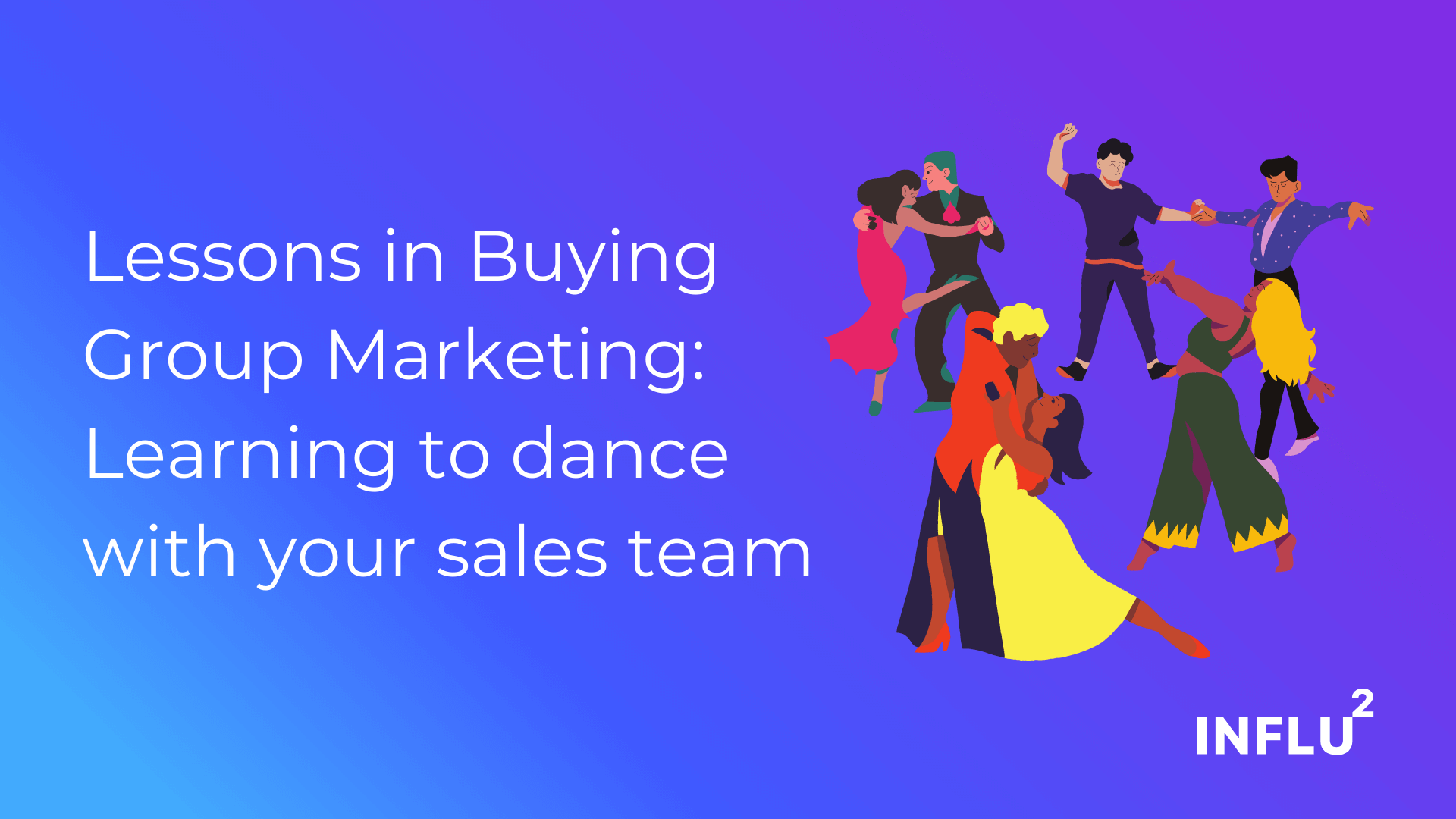

First, you walk. Then you run. What if, instead, you learned to dance?
While Account-Based Marketing (ABM) is a key strategy today, going forward, B2B marketers will take a more holistic view. More of a dance than a race, marketing is evolving to look at the entire lifecycle and how to care for the customer relationship at each phase. Driven by this holistic approach, Forrester proclaims in its New Tech: Account-Based Marketing Q1, 2022 report that “the term Account-Based Marketing will disappear by 2025 as B2B organizations focus on the entire customer lifecycle.”
As part of this evolution: Buying Group Marketing (BGM). While ABM blankets your key accounts with messaging, BGM targets the specific people involved in purchase decisions at your key accounts. It does this through carefully crafted buying group personas and delivering custom campaigns to buying team members. It’s a person-based marketing approach versus an account-based one. BGM is about relationship building – externally and internally.
While that sounds great, the devil is in the details.
One of the keys to implementing a successful BGM strategy requires a fundamental paradigm shift in how you market. As Forrester reinforces in the New Tech report, “sales and marketing must come together to identify and prioritize buying groups for effective ABM.”
A lead isn’t something to be tossed over the wall at the MQL stage for sales to run with. Employing a BGM strategy, requires marketing and sales to work together at every stage of the customer lifecycle from awareness to deal and beyond.
If your marketing and sales alignment has looked more like a tussle than a dance in the past, it’s time to streamline your moves into elegant choreography. Here’s how you and sales can ditch your two left feet and learn to dance well together.
How BGM sales-marketing alignment works
Let’s set the scene with an example from the movie Dirty Dancing.
In this 80s classic, there is a scene where Baby (the main character) is learning to dance the Mambo with Johnny (the dance instructor). His usual partner, Penny is on the sidelines and can see that Baby is struggling to learn the steps. So, Penny steps in and guides Baby from behind while Johnny leads. And the three of them move together in fluid unison to the music until Baby gets the moves down and learns the dance.
How does this relate to Buying Group Marketing?
In an effective BGM strategy, Johnny represents the sales team, Penny represents the marketing team, and Baby is the prospect. Marketing and sales work together to guide the prospect into finding the right steps and rhythm that will help them succeed.
This is a fundamental shift in how sales and marketing has traditionally worked together. With BGM, marketing is no longer stuck on one side (or in Dirty Dancing… the corner) of the MQL wall but involved in all the stages of the process. Because of this, each department needs to know the steps and be able to dance together first. Then they can bring the prospect in and teach them to dance, too.
5 Steps to improve your marketing and sales alignment
Below are five key areas to help you improve your marketing and sales alignment for an effective BGM strategy:
1. Align goals and operations
To ensure that your funnel is unified, sales and marketing must have common goals and a common bench of metrics that deliver insights for continuous improvement. One of the first steps in the process is coming together to develop this operational backbone and to create service-level agreements, defining the goals and the lead management process from the top of the funnel to the bottom.
2. Share your data
Sales and marketing teams need to have access to all the same data and insights around contacts and accounts at the same time. This will prevent missteps and ensure that everything that is created is of value to your prospects and enhances their journey.
3. Orchestrate your messaging
Because the messaging in BGM is more highly targeted to buying group members, it’s important to team up and work through your air-cover narratives and carefully orchestrate them. The focus should be consistent messaging that is on-target for every successive stage of the funnel with the end goal of generating value for the buying team member.
4. Align your platform structure
Synergy across sales and marketing starts with your systems. The platforms that you choose to use for BGM, whether a CRM, marketing automation or sales engagement tool, should be engineered to share data, processes, messaging, goals and metrics.
5. Communicate continually
To execute a BGM strategy well, you will need to design a feedback loop between the sales and marketing organizations for regular communications regarding pain points and successes and for developing mechanisms to test and learn. Content is king, but context is everything because your data is shared. There should be an open communication loop to adjust campaigns for the context of the prospect along the way.
How a BGM approach helped a B2B industrial workforce platform close more deals
One B2B platform whose business is to digitize the industrial workforce took a Buying Group Marketing approach, using top-of-the-funnel advertising to close more deals.
This organization had a highly specialized audience that was particularly difficult to reach. While marketing did bring in some viable leads, the organization’s existing solution (that was based upon reverse IP look-up) was insufficient to produce high-quality leads. The result was nearly non-existent lead follow up by the sales team. The lack of follow up led to a strained relationship between sales and marketing.
There needed to be better alignment within the two teams and a more granular approach to marketing efforts. To do this, the marketing team used sales’ data to create highly customized advertising campaigns using Influ2.
Sales were delighted with the results, receiving immediate notifications about engagement on the ads from the contacts they had been trying to reach. They were also appreciative of the context-driven insights and lead prioritization that marketing was now able to deliver. And what started as a pilot was expanded globally.
Taking this approach helped the marketing and sales teams better collaborate. They defined the processes, determined the appropriate infrastructure, orchestrated their messaging, and openly communicated with each other to improve the pipe and close more deals.
A meaningful competitive advantage with BGM
According to Forrester, “Many organizations have already evolved or are evolving processes and technologies to account for buying groups; those organizations have a meaningful competitive advantage over those who do not.”
Buying Group Marketing is here to stay. While there are many components involved in building an effective BGM strategy, marketing and sales alignment is among the most important. These five steps will help you get started with your BGM marketing-sales alignment.
Remember: not stepping on each other’s toes is great. But you can do much more. Learn to dance with your sales team and help your prospects achieve their lift!
This sponsored article was written by Nirosha Methananda, VP of marketing, Influ2.





